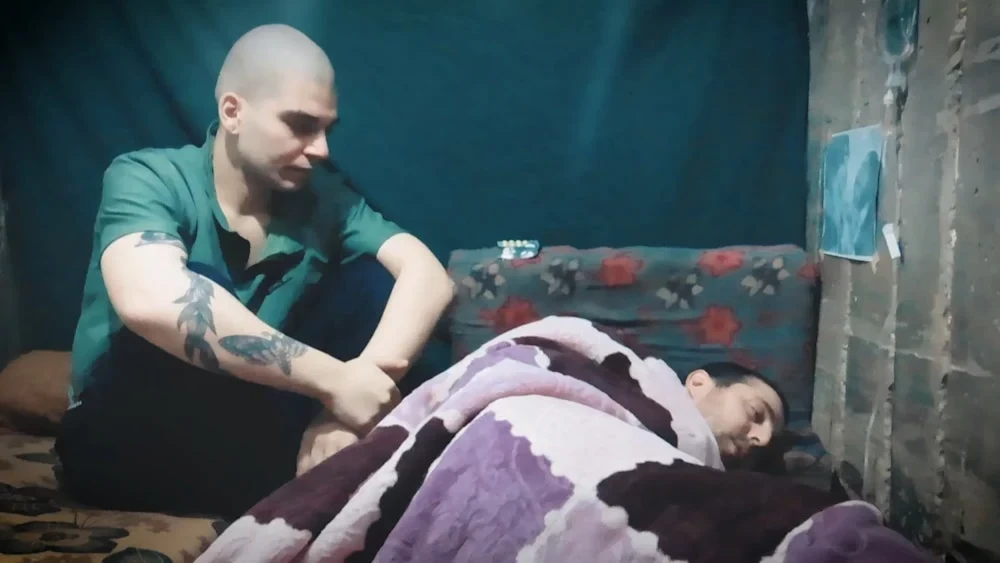Israeli captive pleads for end to war, says 'life in danger'
An Israeli prisoner held in Gaza warns that time is running out, revealing psychological breakdowns and starvation among captives amid the ongoing war.
-

Israeli captives Prisoner 21 and Prisoner 22 in a video released by the al-Quds Brigades on May 10, 2025 (Military Media)
The military media wing of al-Qassam Brigades, the armed wing of Hamas, released a new video message from an Israeli prisoner in Gaza, identified as “Prisoner 21,” who described the deteriorating health and psychological condition of another captive referred to as “Prisoner 22.”
In the recording, Prisoner 21 appealed directly to the Israeli occupation government and the Israeli public, warning that the prolonged war poses a serious threat to the lives of all remaining captives. “Every minute we spend here is critical. We can’t sleep. Our lives are in danger,” he stated.
Prisoner 21 revealed that his fellow detainee has been in severe distress since hearing that the war would be prolonged. “A few days ago, he tried to harm himself,” the captive said, noting that he and a fighter from al-Qassam managed to intervene just in time. He added that Prisoner 22 had stopped eating and drinking entirely, underlining the scarcity of food amid the ongoing war and blockade.
The message served as a stark warning about the conditions of Israeli captives in Gaza and the psychological toll the war has taken on them. “There is very little food, and the war and siege are continuing,” he said, describing an environment of extreme deprivation.
'Have you gone mad?'
Addressing Israeli Prime Minister Benjamin Netanyahu directly, the prisoner asked: “What are you waiting for? Our fate is in your hands.” He continued, “Have you gone mad? Why haven’t you stopped the war yet?”
#شاهد.. كتائب القسام تنشر رسالة جديدة لأسير إسرائيلي:
— قناة الميادين (@AlMayadeenNews) May 10, 2025
"إذا أردتم أن تعرفوا عددهم، بكل بساطة اسألوا سارة نتنياهو، على ما يبدو، هي تعرف ما لا تعرفونه!"#الميادين pic.twitter.com/gjwdpMrPV5
He also directed a message to the Israeli public: “Some of the prisoners are still alive. If you want to know how many, ask Sara Netanyahu. She knows things you don’t.”
Turning to Sara Netanyahu, the prisoner asked: “How many prisoners need to die before we can go home?”
Dwindling number of survivors
The message concluded with a chilling question to Israeli pilots and civilians involved in the bombardment: “What do you tell your families when you continue bombing us?”
In the aftermath of the video’s release, the father of the captive who appeared in the footage expressed shock over their deteriorating conditions. He described reports about the declining number of surviving captives as “a shock” and called for an immediate end to the war.
The release of the video has intensified debate within Israeli society regarding the fate of the captives, the strategic goals of the war, and the government's handling of negotiations for their release.
Captives not a priority
Military correspondent Yaniv Kubovich reported that newly issued operational directives to Israeli army commanders ranked captive recovery at the bottom of mission priorities, which reinforces longstanding concerns that the war’s publicly stated objective, the return of captives, was never taken seriously by either the government or military leadership.
Kubovich noted that the internal list of objectives undermines recent statements by Chief of Staff Eyal Zamir and military spokesperson Avi Dovrin, who publicly emphasized that freeing captives was the army’s primary mission.
In contrast, the actual orders show that this goal has been sidelined, casting doubt on the integrity of official messaging.
The editorial also pointed out a shift in language from "abductees" to "hostages," a change that seems more rhetorical than substantive. Haaretz argued that rebranding the captives does not change the reality on the ground or the lack of urgency in efforts to secure their release, which remain overshadowed by broader military aims.

 4 Min Read
4 Min Read








